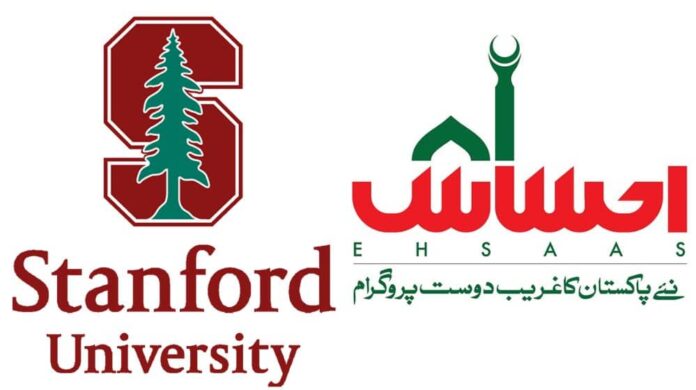Ehsaas Programme’s key achievement is addressing the importance of building a holistic and integrated anti-poverty program. Rather than a rebrand of BISP, Ehsaas has been a comprehensive overhaul and reform of the overall anti-poverty landscape in Pakistan: the study says.
The Ehsaas Program has been dubbed the international standard for the establishment of a progressive welfare state by Stanford University’s Freeman Spogli Institute for International Studies (FSIIS). Ehsaas Program is a world-leading anti-poverty initiative to uplift the most vulnerable individuals, according to a working paper titled “Frameworks for a Developmental Welfare State: Lessons from Pakistan’s Ehsaas Program” written by Sir Michael Barber and Muqueet Shahzad.
The poverty-reduction program was introduced in 2018 by the Pakistani government, which is led by the Pakistan Tehreek-e-Insaf (PTI). The initiative aims to combat the nation’s poverty through a comprehensive and integrated approach.
The Ehsaas Program offers a range of services. Unconditional cash transfers, specialized subsidies, and expanded health and nutritional coverage are a few of these programs.
Policymakers from all across the world can benefit from the Ehsaas Program’s lessons on policy, programmatic, and reform implementation, including the value of strong institutions, effective data, and technology use, and adopting an integrated and inclusive strategy to combat poverty.
The working paper stated that while the Ehsaas Program’s services are effective, open, and efficient, they also aid in closing the gap between the government and its population.
The report made note of the fact that concerns have been voiced about the future course of “Ehsaas” now that Imran Khan’s federal cabinet has been replaced by the new political leadership. It shows that regardless of the political leadership, “Ehsaas” needs to continue to be a top priority for future governments if it is to reach its full potential.
According to the report, a key lesson from Ehsaas has been the importance of building a holistic and integrated anti-poverty program. Rather than a rebrand of BISP, Ehsaas has been a comprehensive overhaul and reform of the overall anti-poverty landscape in Pakistan.
The report says comprehensive anti-poverty programs are only sustainable if they are inculcated in an economy that can generate the revenue to support them. If the macroeconomy is weak, governments will continue to rely on external sources such as foreign aid, and will not be able to sustain their anti-poverty efforts over time.
The report further depicts that the successive leaderships need to commit and ensure the needful for the smooth running of ‘Ehsaas’ and move forward with the rapidly growing anti-poverty landscape of Pakistan.
A World Bank study says that certain factors play an integral role in scaling up the process of poverty alleviation:
1. Commitment and Political Economy for Change
2. Institutional Innovation
3. Learning and Experimentation
4. External Catalysts
Commitment and Political Economy for Change relate to decision-makers commitment to enacting changes that are essential for reducing poverty as well as to facilitating change and fostering consensus in support of those aims.
Building institutional capacity for innovative problem-solving, removing institutional barriers to implementation, and adapting to shifting political and economic conditions is referred to as institutional innovation.
When new approaches are explored experimentally and evaluation is incorporated into the decision-making process to determine whether to continue and develop a given strategy, learning and experimentation take place. Widespread replication of effective strategies can result in knowledge spillovers that are applied in new contexts. Examining national and local projects, programs, and policies as well as adopting new ideas cautiously and tailoring them to the circumstances where they will be used are all examples of learning.
External catalysts are elements and agents that cause a shift in public opinion in favor of the reforms being spearheaded by the government.
The current and upcoming governments in Pakistan must consider these elements when they embark on or continue to work on poverty-reduction initiatives because a sustainable program like Ehsaas needs a thorough and well-thought approach. Besides, the financial corruption and undue taxation policies for the lower classes are something the government needs to work on. An all-encompassing fiscal framework is Pakistan’s foremost need.




